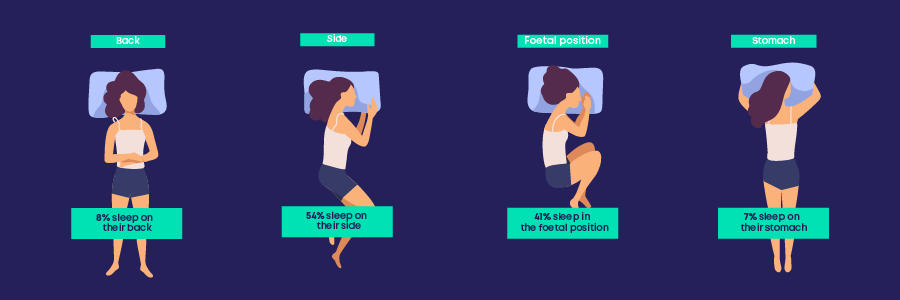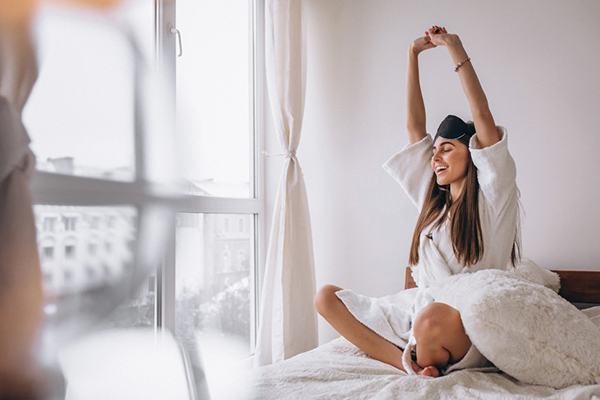On average, we spend around a third of our lives sleeping. Our bodies use this time to regenerate and heal, which is vital for mental and physical health and the quality of your waking life, including your productivity, emotional balance, brain and heart health, immune system, creativity, vitality, and even your weight.
Your sleeping pose can have a major impact on your slumber – as well as your overall health! One key aspect of poor sleep quality, which many people do not realise, is that sleeping in awkward positions, may have an adverse impact on your spinal health. It can potentially cause back and neck pain, muscle cramps, fatigue, impaired circulation and heartburn, amongst other adverse symptoms, so protecting your back while lying down is vital.
This would then suggest that modifying your posture in everyday life doesn’t just refer to sitting and standing! As with standing and sitting, the key to correct sleeping posture requires a position that maintains the curve in your lower back and keeps your spine in a neutral position. So, which sleep spot is best? Take a look below from best to worst……

1. On Your Back
Only about 8 percent of adults sleep on their backs and even though it’s not the most popular position, it’s by far the healthiest option. It is generally agreed that sleeping on your back is the best position for spinal health. Sleeping on the back evenly distributes weight across the surface of your body, allowing your head, neck and spine to rest in a neutral position. It can also help reduce pressure and ensure proper alignment of your internal organs. You may choose to place a pillow under your keeps to keep to the natural curves on your spine. The only downside for those snorers amongst you – it can make snoring more severe!
2. On Your Side
Around 54 percent of people choose to sleep on their side (where your torso and legs are relatively straight), but assuming this position incorrectly can possibly result in spinal health issues. If you can’t sleep in any other position, try lying with a slight bend in your knees and consider putting a pillow between your knees so that your pelvis stays in a neutral position. This can reduce the pressure placed on the spine and provide alignment.
3. In the Foetal Position
Resting in a foetal position (where you’re on your side and your torso is hunched and your knees are bent) is the chosen position for 41 percent of people, but it can restrict breathing in your diaphragm, if curled too tight. This position can also leave you feeling a bit achy in the morning, particularly if you have arthritis in your joints or back. One suggestion would be to straighten out your body as much as possible, instead of tucking your chin into your chest and pulling your knees up high. You can also reduce strain on your hips by placing a pillow between your knees.
4. On Your Stomach
While this is good for easing snoring, it’s bad for pretty much everything else! 7 percent of adults choose this pose, but it can create problems with your spine, since it’s hard to stay in a neutral position. It also places excessive pressure on your neck due to twisting your head and placing strain through your spine. Added to this, stomach sleepers put pressure on their muscles and joints, which could lead to numbness, tingling, aches, and irritated nerves. It’s really is better to try and find another position, but if you must sleep on your stomach, try lying facedown, instead of with your head turned to one side—with your forehead propped up on a pillow to allow room to breathe.
And finally, take care care when turning in bed, as this is the time when your spine can be misaligned during twisting and turning. Move your whole body together and tighten your core. Due to the fact that we lie in the same position for long periods of time, it is advisable to stretch after sleeping.
If you are persistently complaining about any form of back or neck pain and are concerned that it may be caused by your bed, mattress or sleep position, or if you would just like some advice, then please feel free to contact us and one of our osteopaths or physiotherapists will be more than happy to help.





